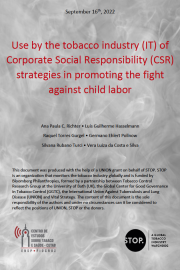
This document aims to address the CSR strategies used by the tobacco industry in Brazil to address child labor, especially in tobacco growing regions of the country. It also addresses the industry's CSR strategies aimed at children and adolescents in urban environments, which include projects to create startups aimed at youth entrepreneurship and other projects aimed at inserting young adults into the labor market.
RICHTER, Ana Paula; HASSELMANN, Luis Guilherme Hasselmann; TORRES, Raquel; POLLNOW, Germano Ehlert, TURCI, Silvana Rubano; SILVA, Vera Luiza da Costa e. Uso pela indústria do tabaco (IT) de estratégias de Responsabilidade Social Corporativa (RSC) na promoção ao combate ao trabalho infantil [projeto STOP]. Centro de Estudos sobre Tabaco e Saúde (Cetab), Rio de Janeiro, 21 out. 2022. 30p.
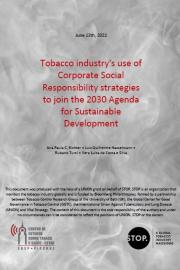
This document consists of an analysis of publications on Agenda 2030 and IT CSR actions available for academic research (abstract, report, file, scientific article, review, monograph, etc.), available in traditional media (radio, television, newspapers, pamphlets , etc) and available on digital media (social networks, blogs, YouTube channels, e-mail, among others), in the period between 2012 and 2021. For the search, the following descriptors were used: (SDG) OR (ODS) OR (Agenda for sustainable development) OR (2030 Agenda) OR (Sustainable Development Goals) OR (Agenda for Sustainable Development) OR (sustainable development) AND (tobacco industry) OR (tobacco industry)) AND (corporate social responsibility) OR (social corporate responsibility) AND (Brazil) OR (Brazil).
RICHTER, Ana Paula; HASSELMANN, Luis Guilherme Hasselmann; TORRES, Raquel; TURCI, Silvana Rubano; SILVA, Vera Luiza da Costa e. Uso pela indústria do tabaco de estratégias de Responsabilidade Social Corporativa para se associar à Agenda 2030 para o Desenvolvimento Sustentável [projeto STOP]. Centro de Estudos sobre Tabaco e Saúde (Cetab), Rio de Janeiro, 13 jun. 2022. 44p.
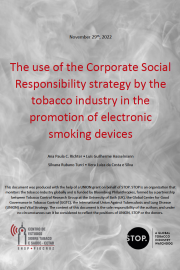
Changes related to the interference of interested sectors and the role of the State in the economy and society are a phenomenon that has been happening worldwide in recent decades and has consequently generated discussions about the role of private organizations in public health issues (Serpa & Fourneau, 2007). A growing number of companies worldwide have been striving to incorporate corporate social responsibility (CSR) as an integral part of their business. Currently, there is no consensus on the definition of the term CSR. However, authors such as Harjoto & Jo (2011) and Cai and colleagues (2011) suggest that the definitions of CSR refer to the efforts of companies to serve the society and the environment beyond what is required of them.
RICHTER, Ana Paula; HASSELMANN, Luis Guilherme Hasselmann; TORRES, Raquel; TURCI, Silvana Rubano; SILVA, Vera Luiza da Costa e.O uso da estratégia de Responsabilidade Social Corporativa (RSC) pela indústria do tabaco na promoção dos Dispositivos eletrônicos de fumar (DEFs) [projeto STOP]. Centro de Estudos sobre Tabaco e Saúde (Cetab), Rio de Janeiro, 23 mai. 2022. 61p.
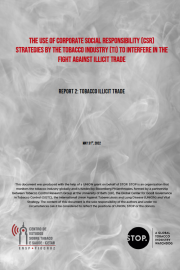
The illicit trade in tobacco products represents a major global concern for public health, economy and public safety. More specifically, the illicit trade in tobacco products undermines tobacco control policy efforts, particularly in relation to tax policy. As they are not taxed or regulated, illicit tobacco products do not have health warnings or packaging or labeling requirements, which favors their consumption. As with other regions in the world, the illegal cigarette trade in Mercosur involves lower average prices compared to taxed cigarettes. Furthermore, the increase in the accessibility of cigarettes, via the informal market, combined with the lower prices of smuggled products - and therefore not subject to regulation - favors the consumption of cigarettes by young people and low-income populations 1,4.
HASSELMANN, Luis Guilherme Hasselmann; RICHTER, Ana Paula Cardoso; TURCI, Silvana Rubano; SILVA, Vera Luiza da Costa. Uso pela indústria do tabaco (IT) de estratégias de Responsabilidade Social Corporativa (RSC) para interferir no combate ao comércio ilícito [projeto STOP]. Centro de Estudos sobre Tabaco e Saúde (Cetab), Rio de Janeiro, 23 mai. 2022. 49p.
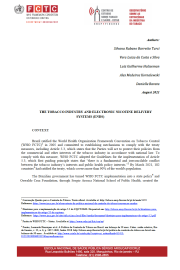
By ratifying the World Health Organization's Framework Convention on Tobacco Control (FCTC/WHO) in 2005, Brazil committed to establishing mechanisms to comply with the treaty's measures, including article 5.3 which states that “the Parties shall act to protect these policies from the commercial interests and other interests of the tobacco industry, in accordance with national legislation”. To support compliance with this measure, Guidelines were defined for the implementation of article 5.3, whose first guiding principle states that “there is a fundamental and irreconcilable conflict between the interests of the tobacco industry and the interests of public health”. By March 2021, 182 countries Parties had ratified the treaty, which covers more than 90% of the world's population.
TURCI, Silvana Rubano Barretto; SILVA, Vera Luiza da Costa e; HALSSEMAN, Luiz Guilherme; KORNALEWSKI, Alex Medeirosi; BARATA, Danielle. A indústria do tabaco e os dispositivos eletrônicos para fumar (DEFS). Cetab/Ensp/Fiocruz, Rio de Janeiro, 1 set. 2021.